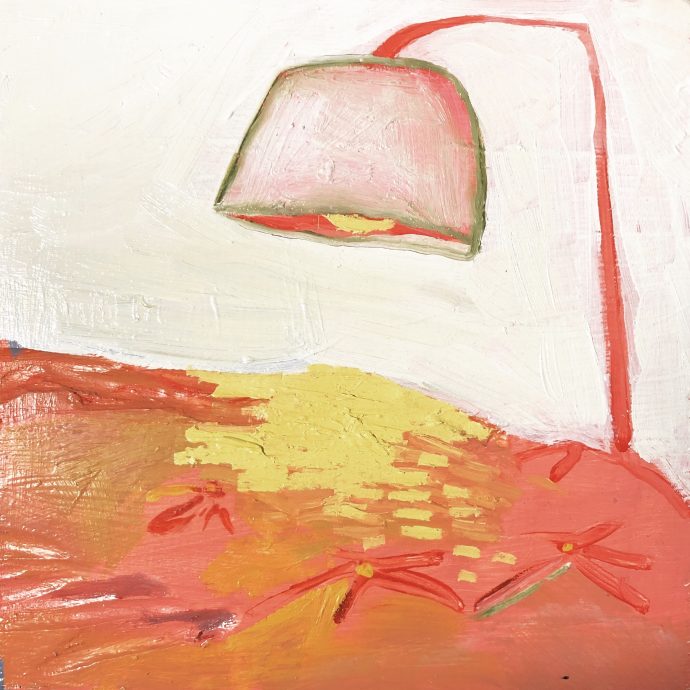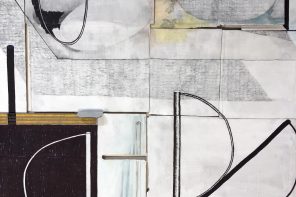My dog won’t stop jumping on the couch, so eventually I love him for it. My husband can’t keep a steady job, so instead I grow inordinately fond of his ambient sound collages. Since he will not, I eventually try to sell them on his behalf. If to love is to be resigned to compromise, the compromiser and the compromisé soon forget who is who, which renegotiation is being renegotiated unto what agreement that needs to be thought through anew.
Full of faith, the priest accepts his parishioners’ petty deceits and deceptions in the manner of a man lowering his head at a low doorway, ducking down slowly, incrementally, then after passing through, rising up straight again, straighter even than before.
The best lies are the ones that eventually turn true.
The plumber peers under the sink knowing that every clog in the drain masks a larger problem, one that he will never be able to fix. Knowledge of this fact keeps him going. It proves his self is different than his worth. Serenely, it enables him to succeed.
At the end of a long day, each thought the name of a beautiful city in a foreign country that you can’t properly pronounce. You can’t stop thinking them.
Later, I ask someone 20 years older than me: Do you remember when you first began attending to your desires with muted inattention? Not with despair, but indifference; not with sorrow, but detachment, unroiled and inert? She responds a month later, months after I’d given up on receiving a response:
If, at your age, you’re already thinking about that, you’ve crossed the threshold. Welcome home—oblivion is free!
In private, only to herself, the great writer resigns herself to her greatness immediately, and such an internal resolution never wavers. By the literary community, too, she is quickly accepted and praised as great; what idiosyncratic vision, what fluidity of voice. She performs such greatness with aplomb, accepting every honor and award humbly, taking care to insist on her relative mediocrity, the superior craftsmanship of her many lesser-known friends. For this she is even more beloved, widely-read by the critics and public alike. It is only on her deathbed that she realizes the full extent of the thing, unwavering and remarkable. Then, awake for the first time, the possibility comes into her head that she might never have been great.
“Fu Yüeh was once in bonds, before he was minister to Wu-ting. So disaster is to fortune as strands to a single rope.”
“Let your life be like a floating, your death like a rest.”
“Find no cause for complacency in life, but cultivate emptiness and drift . . . Be not dismayed by petty pricks and checks!”
Perhaps the Taoists understand best that happiness is rarely earned or understood; it exists with scant relation to work or virtue, knowledge or ignorance. That’s what makes it attainable to any and everyone. That’s what makes it impossible and free.
But I don’t want to be a genius! the young genius laments to anyone in earshot. The petulance, the outbursts, the heavy sighs, the outbursts. As prodigy exhausts, prophecy invokes: the busy parents in the background, from one practice to another rushing to and fro, their prodigies simultaneously eager and withdrawn. I just want to be me he sobs into his pillow. I just want to be me she screams before slamming the door.
Reporting on the city’s homeless population, the newscaster interviews a man who unblinkingly repeats into the camera the sentence Those that live this life to steal, come back to be stolen from. Over and over again, until finally he has to be gently pulled away by an idle videographer. The producers later decide that what the camera captures of the man, the audience should not see, and the footage is cut in the editing room. But the newscaster never forgets the man’s words. Having tried and failed not to listen, she unconsciously resigns herself to a theft that all the reporting in the world will never be able to accurately cover. What has she stolen? She herself doesn’t know, but it’s a lingering that refuses to subside, that must have purchase by virtue of its lifelong prolongment in her head. After that night, she never sees the man again, even forgets him and his prophecy during the happier times of her life, but inevitably she drifts back to the righteousness of his conclusion. Lacking God and a belief in reincarnation, she accepts his proclamation as something she cannot understand and has no power to refute. Loyalty of the deepest kind, it haunts her unreservedly.
Define best.
Владивостока.Σμύρνη.Huánucovenird.
At the start of his career, the politician resigns himself to the fact that progress is a great ship that only incrementally makes headway through the vast and turbulent waters. This lack soothes him, enforces the notion that he is a mere cog in a machine, that nothing is much expected of him other than his ability to get reelected. Surprising himself most of all, by the end of his career, he has done so much good for so many people. Still, he believes in little—not bureaucracy nor democracy, not politics. Fingers interlocked, not a pair of hands held too tightly together; not humanity. For a very short period of time, he is a mere deckhand on that ship, destination unknown. At every reelection party, he raises his arms in victory, pure, hollow.
What the arsonist doesn’t understand about herself she incinerates. But in the chars left behind are modes of thought and dream still more mysterious.
The worst lies are those that fester into a firm handshake looking you right in the eye, dead-center, the way they smile showing all their teeth, straight, white, precise.
The painter lives his life in revolt of the six primary colors he has been given. He does not desire more, but he does envision another realm of possibility, where light and dark are not opposites that attract, dead-ended, but instead are pressure points that ascertain how something as constant as oxygen can be as colorless as air. Choose your essentiality, but make sure you choose the right one, the essential one. Just words, I know. But in his work, the painter takes care to make each hue sound like a slipping, smell like over there, over there, it happened right over there. Violet, blue, green, yellow, orange, red.
A jugular nerve, a sunspotted moon-pock only visible with a powerful telescope, the actress assesses her career at the age of sixty. Height of her power, all’s slowing down, roles sparse or middling. At twenty-five she’d attached herself to her ambition with a feral clarity. Now her enmity is silent and precise, devoid of any mitigating assurance or sense of redemption. When you look into that telescope, what you see is far from hidden—then and now, it is visible, it shines.
Swaying in the wind or stewing in the rain, each blade of grass resigns itself to a green it will never be.
The priest ducks his head at the low doorway, rises straight once again. The priest ducks his head at the low doorway, rises straight once again. The priest ducks his head at the low doorway, rises straight once again.
We hope to resign ourselves to hope. It sometimes feels impossible to get there. Knowing that it won’t be taken out, the dog won’t stop whining to go out.
I want to be me. Over and over in petite voices, virulent in their stridency. I want to be me. Just ignore them and they’ll go away, grow up to be glorious or themselves. I want, I want. They’ll see.
Jeff Alessandrelli is a writer living in Portland. Most recently he is author of the short essay collection The Man on High: Essays on Skateboarding, Hip-Hop, Poetry and The Notorious B.I.G. In addition to his own writing, Jeff directs the vinyl-record literary label Fonograf Ed., which has full-length albums out by Alice Notley, Harmony Holiday, and a collaborative LP by Susan Howe and Nathaniel Mackey.



